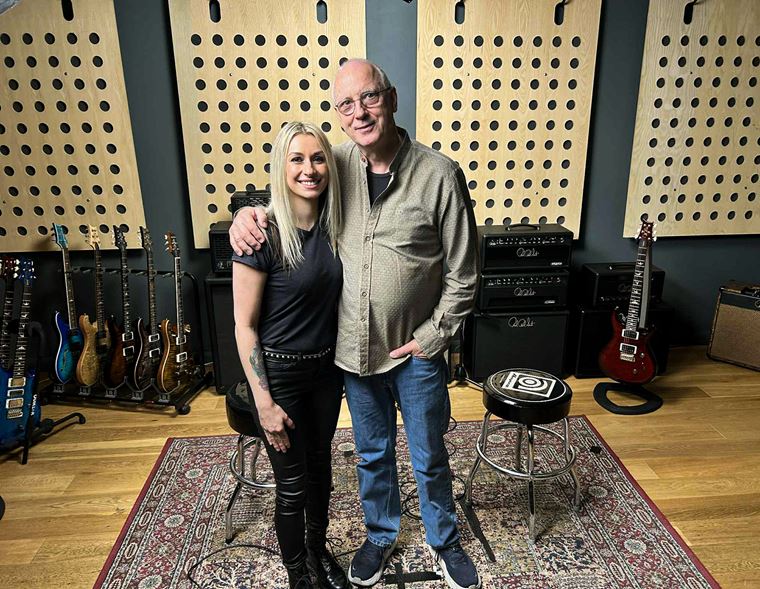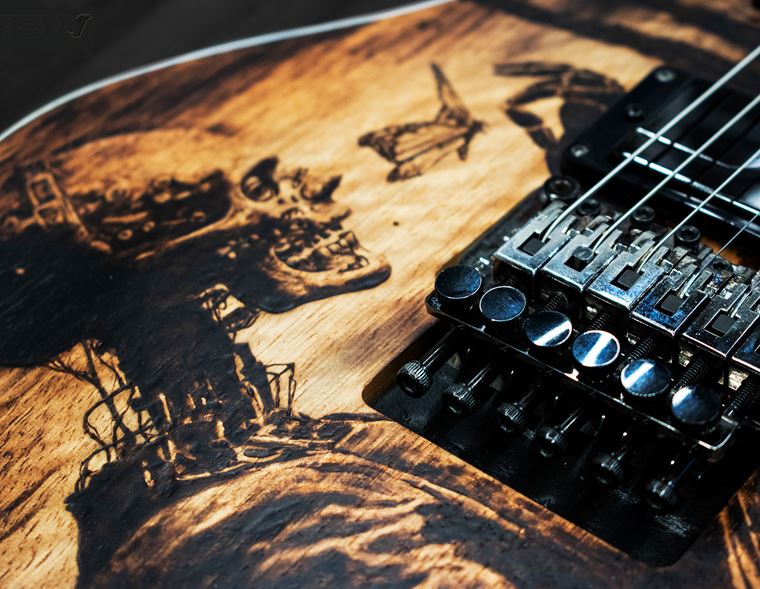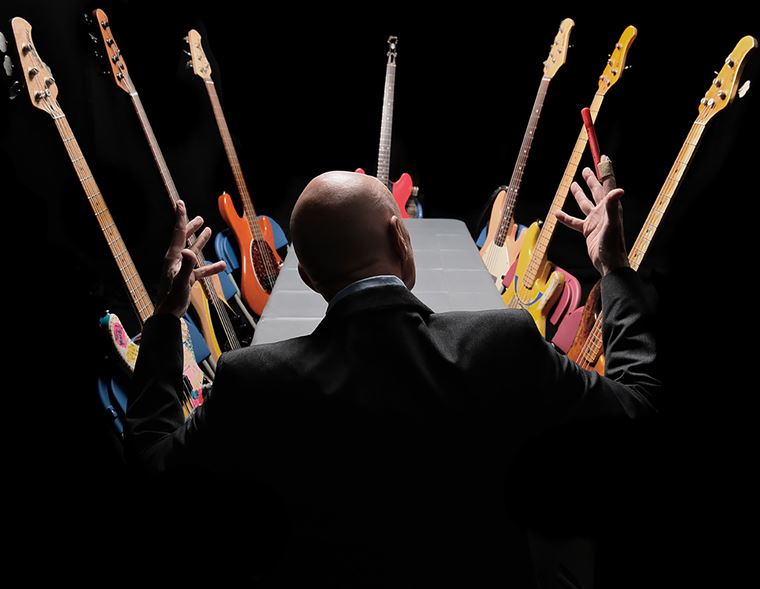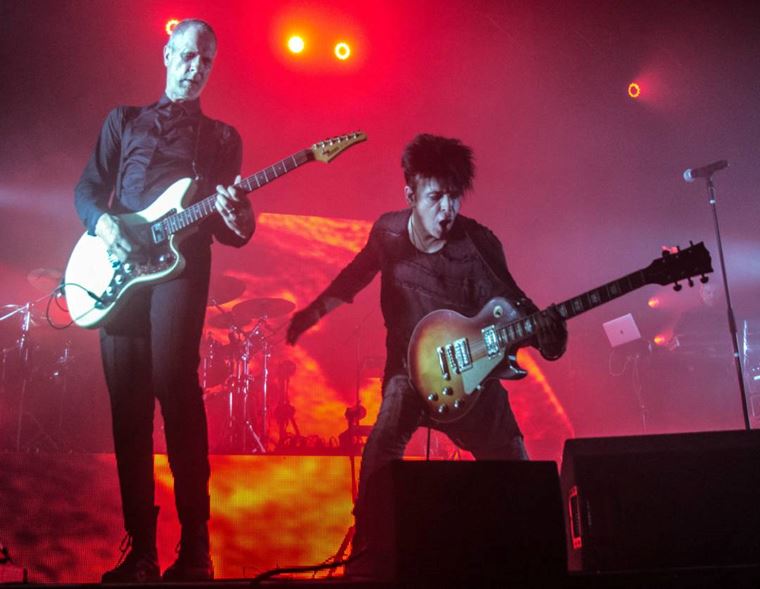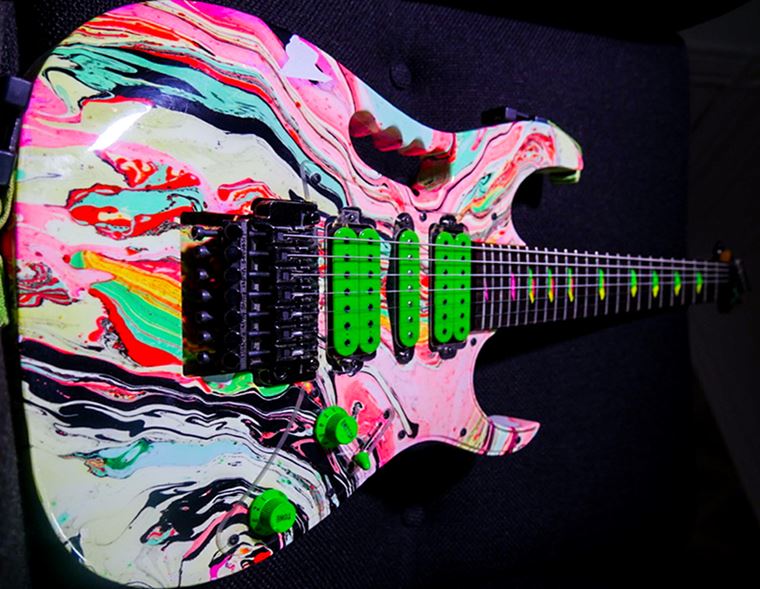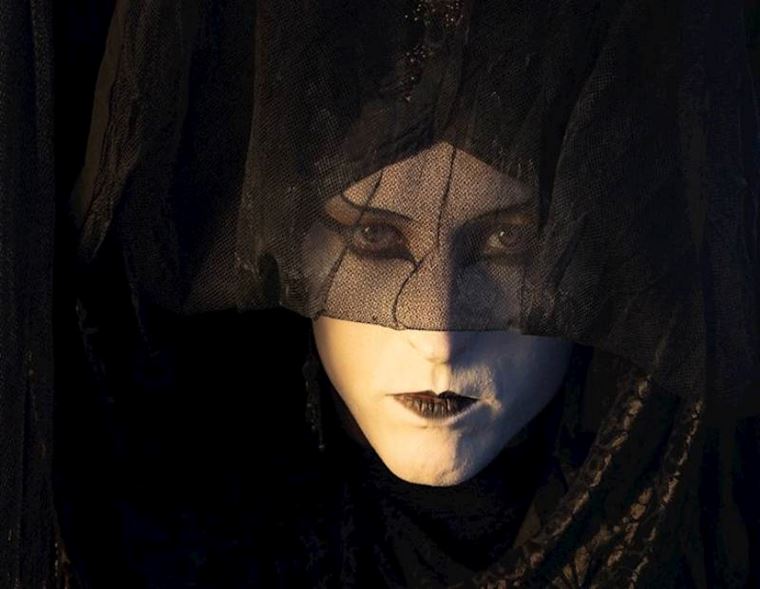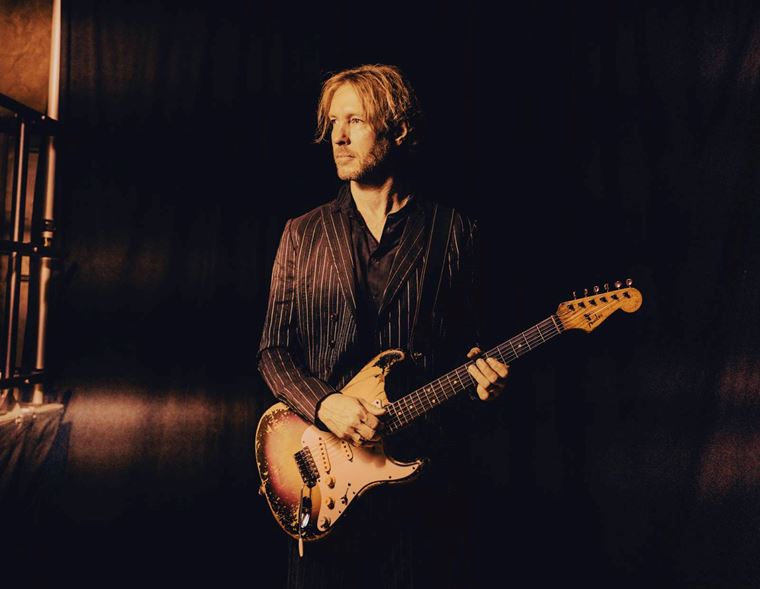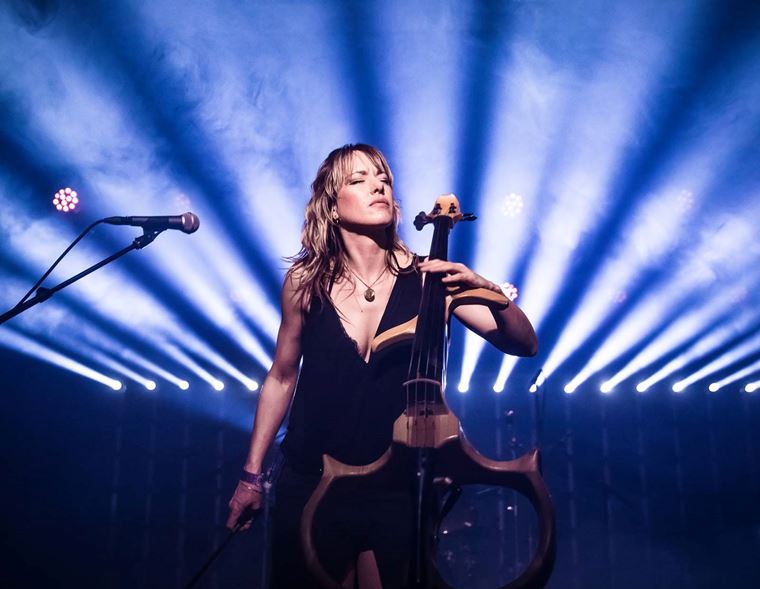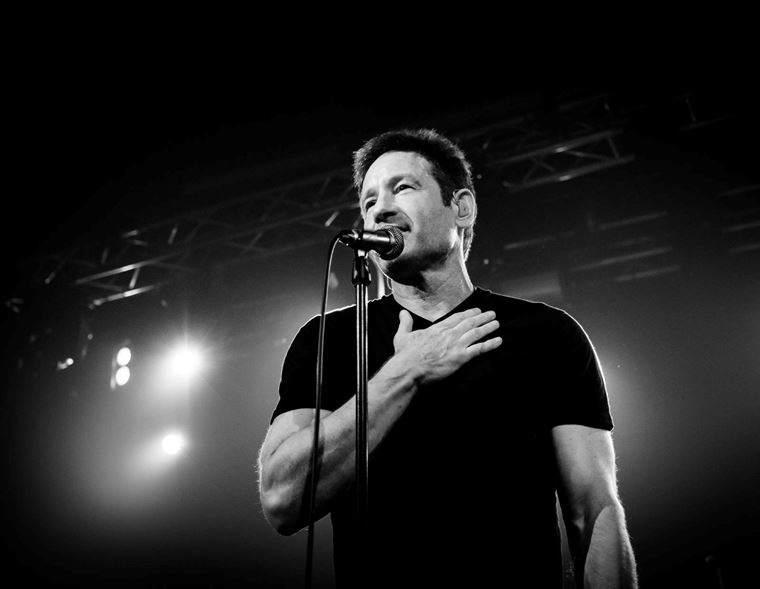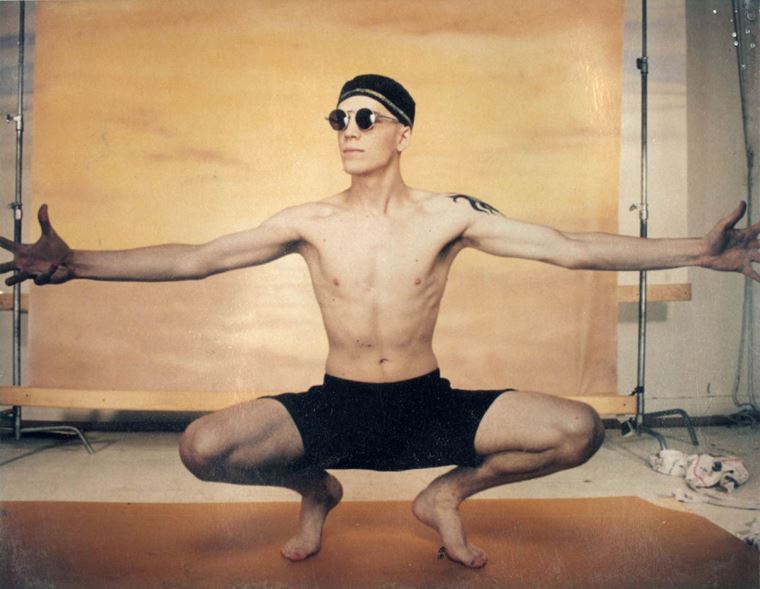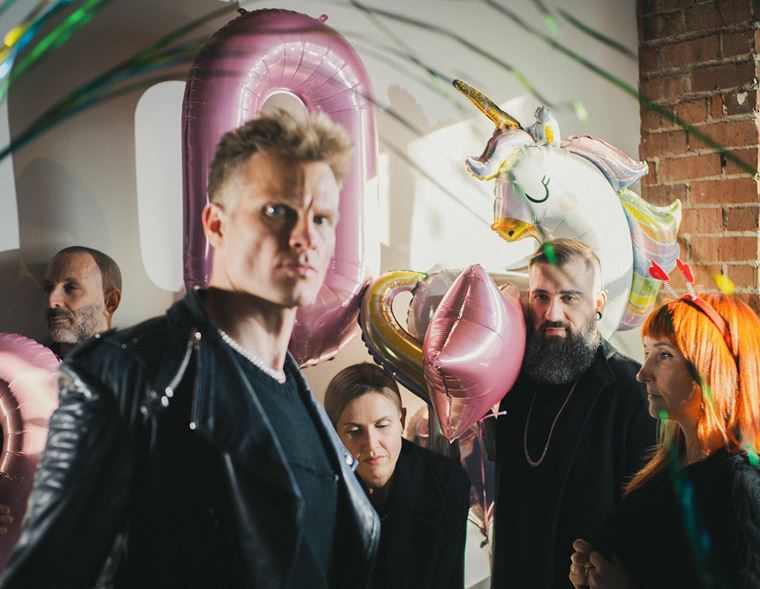Robin Finck EXCLUSIVE: NIN, Cirque Du Soleil, Danny Elfman and EYES OUT
Do you ever feel like just packing it in and joining the circus? Leaving everything behind and entering an entirely other world, where you can discover and re-discover all the myriad joys of life?
It’s a beautiful fantasy, and one that appeals now more than ever, perhaps. Well, we know one guy who did exactly that, and that’s only a tiny part of his story! Robin Finck’s life includes being the lead guitarist in Nine Inch Nails, the lead guitarist in Guns ‘n’ Roses, a performer in the Cirque du Soleil, a performer in iconic TV show Twin Peaks and also a composer and videogame developer. Judging by that rollcall, it seems that running away to join the circus isn’t that bad an idea after all...
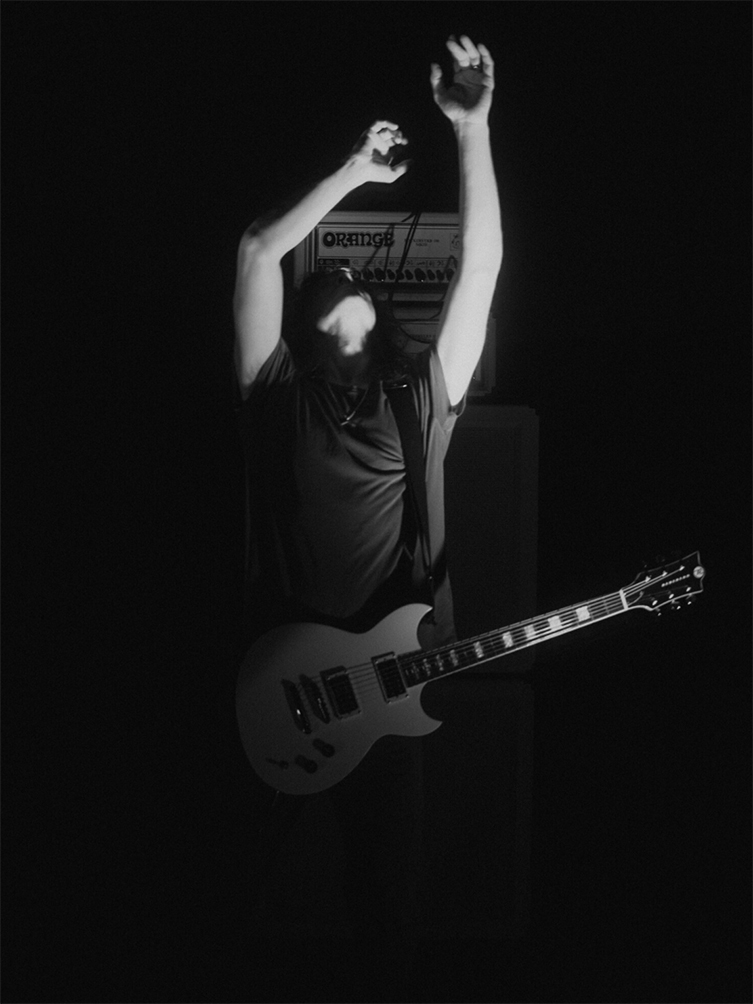
(Photo: Arkia Jahani)
We first spoke to Robin early last year, before the dark cloud of Covid descended on the planet and changed a great many things. In our initial chat, we covered his new Reverend signature guitar, his playing style and his influences. Read about it right here in our previous Robin Finck interview if you missed it first time round. Covid was a vague, distant rumour of a news report back in January 2020, believe it or not. In our interview, we didn’t manage to cover anything about G’n’R or the Cirque, so there was a loose agreement to pick things up later on in the year, after NIN had been inducted into the Rock n Roll Hall of Fame and played some shows.
That was the plan, anyway.
Jump forward in time a year and a half to join us in the present day. Robin had agreed to talk to me again and this article was intended to be a celebratory piece...a happy counterpoint to all the misery going around the world and a marker that things were returning to how they’d been before. Nine Inch Nails were triumphantly returning to the stage next month for the first time in nearly two years. After the continual setbacks and cancellations inherent in this current covid world - and a Rock n Roll Hall of Fame induction for the band that had to be conducted via Zoom link in the end - it seemed like things had finally gotten to the point where NIN could go out and perform again.
Sadly, the very night before my scheduled Zoom call with him, the Nine inch Nails camp put out an official statement announcing their withdrawal from all live performance obligations for the rest of the year, due to Covid’s lingering presence. The fan base at large seemed to be of the opinion that it was a disappointing but responsible decision. It did leave me, however, slightly concerned that the news would be accompanied by a rain check or indeed cancellation email from Mr Finck regarding our interview.
Friday’s work commitments came and went, and in the early evening I sat at my computer, still not sure if I was going to get through. Happily, at bang-on half past five, my Zoom screen came to life and a portal opened from my place into Robin’s in Los Angeles. We were on! It was early morning over there but Robin was bright, breezy and ready to get into it all. First up was news of his brand new games development company, EYES OUT. Following that, we spoke about the Cirque du Soleil, Danny Elfman and David Lynch. With every tale shared, Robin’s skills as a storyteller came to the fore. He’s an enormously entertaining man to speak to, and you never really know where the stories are going! We laughed a lot, chatted a lot and covered a lot of ground. Here it is, as it was...
Robin Finck Interview
Guitarguitar: So, yeah, we were all set to talk about all kinds of things and then of course the news went out yesterday about the Nine Inch Nails concerts!
Robin Finck: I know.
GG: So, I don’t really know how we might approach that: we were going to go into that whole subject and now it’s not happening!
RF: Yeah, that part, I’m really sad about the state of COVID in our community, still! It’s been too long! As we all know, these shows were booked at a time when we were on an upward trajectory towards community wholeness, or at least heading in that direction as far as COVID is concerned. You can be sure the decision to cancel was a long and thoughtful process and that’s where the decision landed: to try again next year and hope that things turn around.
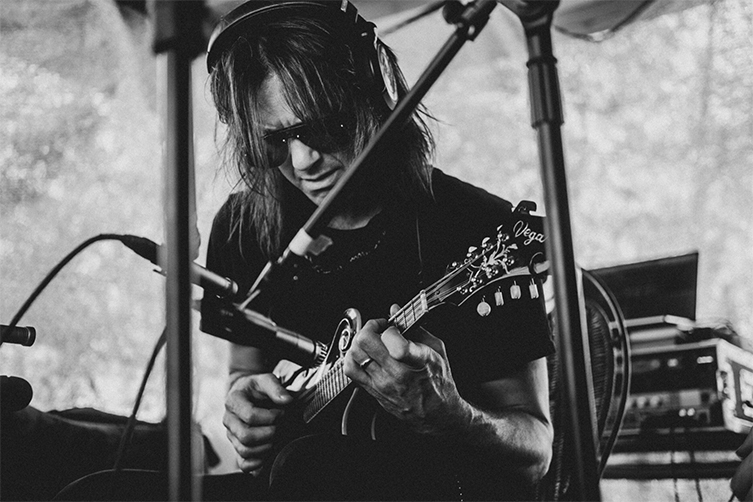
(Photo: Arkia Jahani)
GG: It must be so disappointing for you!
RF: Of course, I and we were looking forward to those shows terribly! I know that so many were travelling great distances to be there, also excited to get outta their house, you know? To get out from underneath this year-plus of stay at home and whatnot. So, to now put the brakes on that, is...just a sad realization.
GG: Unlike some people though, you’ve managed to keep quite busy! You’ve done some pretty cool things! The announcement last week about your video game company, EYES OUT, for example! How did that become a thing?
EYES OUT Game Development
RF: EYES OUT is a game development studio. My partner and I – Cory Davis, with whom I founded the studio – have created this dark, psychedelic, psychological game universe for which we’re heralding a team of veteran developers. Some have worked on previous games with Cory. Others are joining the team anew, and together we are building this immersive experiential world. It’s been an organic, inspired process for about three years now together, Cory and me. We’re continuing to grow, still onboarding a few positions. You can see us at our website.
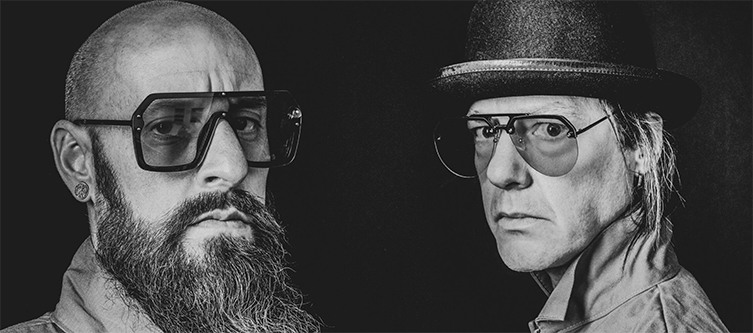
(Photo: Arkia Jahani)
You mentioned the time of COVID. EYES OUT has really been an enormous blessing for me, to be able to kind of lean with both shoulders into this creative endeavor, and at this time; to be collaborating with such an inspired and competent team in a creative space that frankly, still feels new to me.
I’d been becoming more and more immersed in the game development community through the years, and I was just inspired and turned on by the people that I was meeting. It was a fresh medium for me, and one that is a powerful medium for storytelling, which really hooks me as well. The immersive, captivated audience, I can be sure, is listening! (laughs) Imbibing the experience wholly! Cory and I began jamming ideas for this universe through music at first and then through conversation of life and death and the in-between: the silence and distortion. It led to this narrative journey through character and design. We started in front of a whiteboard and, you know, we just kept at it! STILL keeping at it!
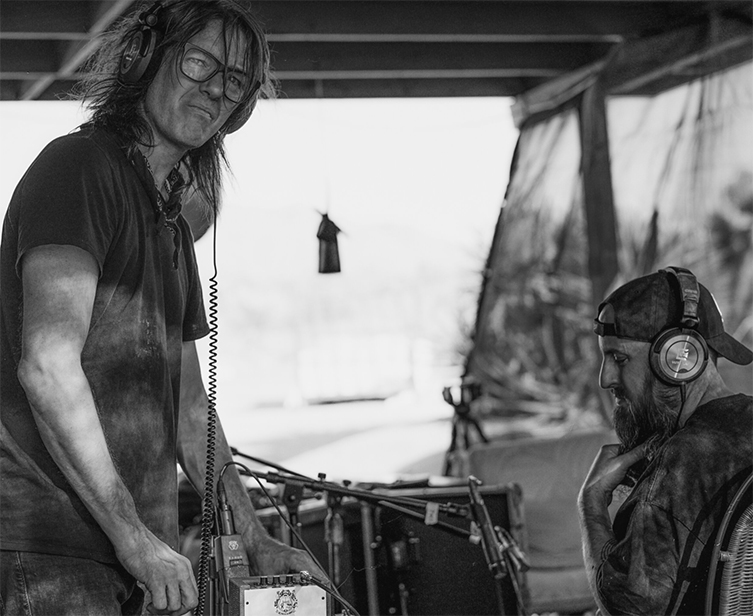
(Photo: Arkia Jahani)
So, back to your question, I have a friend who is a co-founder of Devolver Digital, his name’s Mike Wilson. He had asked me in the mid twenty-teens, whatever that is, if I’d ever be interested in providing score to video games. That was his world; it wasn’t mine at the time. I was very fortunate to be able to toe into a few experiences where I wasn’t having to take on an entire project. So, I really got to learn as I was doing. That’s what really started to ignite my enthusiasm with the thing, because the first experiences were engaging and challenging, and they felt like little successes. I started stringing them together and started meeting more people and travelling to attend conferences. I was among the thousands of us taking notes, really kind of crash-coursing myself as I became more interested.
Fast-forward to one of the many hundreds of people that I was meeting at this time, who led me to Sony Santa Monica where Cory and his then-team were completing a game called Here They Lie. It was a launch title for the PS4 VR headset. I went to playtest that on invitation of somebody I’d met at these conferences, and man, I was really knocked out by the experience! I then got to speak with Cory, who was the director of the project and that really lit me up, and he and I really got on about a lot of things that were important to each of us, not only in aesthetics and art, music, and film but also there was just some kind of resonance there between us. We kept in touch, and I provided music to subsequent projects that he was heralding, prototypes he had brewing, and then in 2018, we had been working together for a little bit and eventually consummated this commitment towards creating what is now becoming EYES OUT.
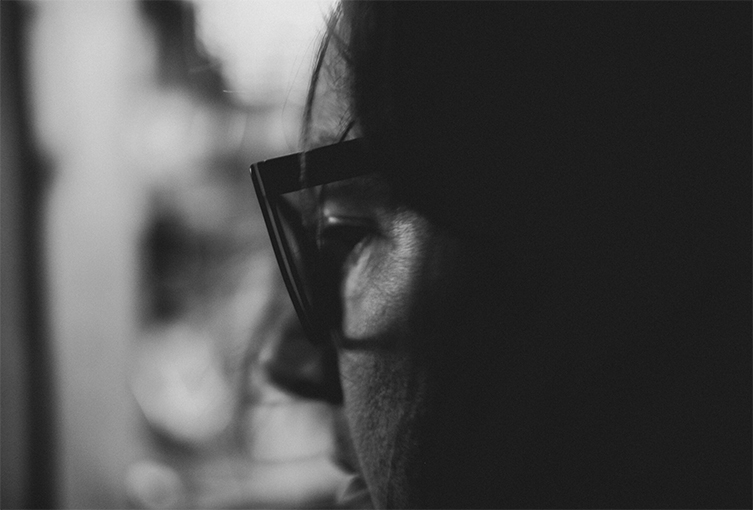
(Photo: Arkia Jahani)
My last show with Nine Inch Nails was at the Palladium in Hollywood, mid-December 2018 and I was at Cory’s house the very next day, us standing in front of the whiteboard together. We’ve been fortunate to be still so passionately engaged about what we’re doing and attracting this kickass team of developers around us. One by one, we’ve been growing these years, so we’ve got a really unique team of development leads, each with their own technical specificity. So yes, we’re making the thing go!
And we’re able to do it remotely, which comes back to the blessing of starting this at a time when everyone was starting to stay shut in. We’re able to be in touch all day through Discord and Slack and screensharing and all this stuff. It also more naturally expanded our network of potential developers beyond Los Angeles, where we live.
GG: Wow this is all unexpected and exciting. We could stay a whole day here. Maybe we should move into some other areas I'd really love to cover? Speaking of unexpected, what can you share with me about your move to the circus?
Cirque du Soleil
RF: Sure. Honestly, what led me there is a longer story than we have time to talk about here today, but the short of it is, I really was following some unreasonable longing for a feeling I couldn’t conjure in my life at that time. It led me to the circus. I was following this feeling before I knew where it was leading, you know? I didn’t know I’d end up at the circus. The feeling started with; I need to get out! I needed to do something different, I needed to leave New Orleans at the time and if that meant the band, then...you know, it was an extremely complicated time for me and my life in a lot of ways, I guess mostly emotionally, and yeah, I didn’t know that it was the right thing to do but I was so uncomfortable not making some move in some new direction that I really just felt pressed...and this is before the internet, by the way.
GG: Yeah!
RF: Or even cell phones (laughs) and I didn’t know anything about Cirque Du Soleil. I had seen some circus theatre performance when I was in Las Vegas, which was the only Cirque show in North America at the time. They had one other travelling show. So, it really felt like I was hitting hyperspace and I was just gonna land wherever I landed (laughs) and I was just gonna move from there. One thing I knew was that I was gonna wake up and I wasn’t gonna be still in the same place.
I really mean it when I say ‘unreasonable’, because it’s really hard for me to put my finger on or to articulate. I wasn’t really taking care of myself, and I was in New Orleans for probably too long and it was kinda easy to just not be actively involved in moving forward in some kind of direction that felt like it had momentum. I didn’t have a lot of momentum.
GG: Yes.
RF: So, it was a challenge, and I was scared I wasn’t doing the right thing...I had to audition for the thing, I didn’t know...
GG: Oh, is that right? Did you show up and have to like, join a line of other guitar players and await your turn?
RF: (laughs) Umm, no, I picked up the phone on the wall in my kitchen and dialed 411, ‘cuz at the time that was like a directory of phone numbers. I called the Treasure Island Hotel; it took me all afternoon to remember the name of the hotel in Las Vegas. I didn’t remember the name of the show. I didn’t know the name ‘Cirque Du Soleil’. All I remember, vaguely, is being in that theatre in some hotel in Las Vegas.
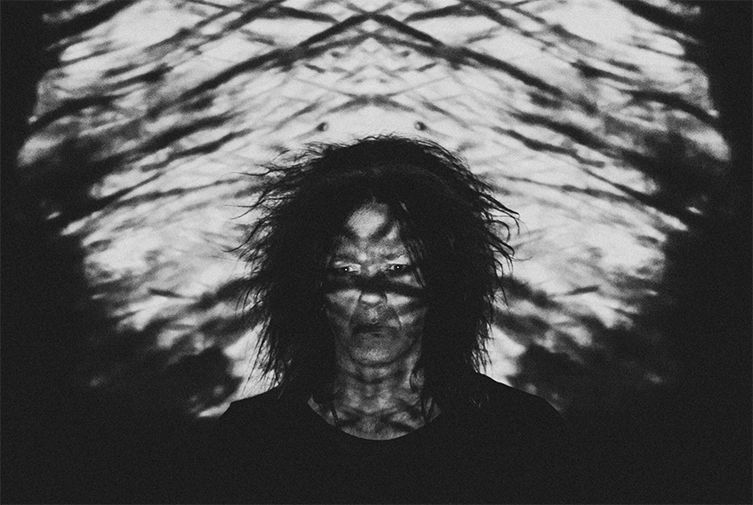
(Photo: Arkia Jahani)
Anyway, I called up the Treasure Island Hotel and the lady who answered was, you know, poised to book me a room. (laughs) But that’s not why I was calling! I wanted to know about the show! So, anyway, there was a lot of high hurdles in that conversation, and eventually she dropped the two words that kind of illuminated me to the next phase of the conversation. She said, ‘Oh, you seek the casting department.’ I said ‘Ah! The casting department! Yes! Yes, I want to speak to the casting department!’ She told me about Cirque Du Soleil, about how their headquarters are in Montreal, and so there were lots of gates, and each time it started to get frustrating and a little bit more like I was venturing in the dark, a bit of a real-life mystery or something, each time I started to feel thwarted – honestly, I was almost ready to say, ‘Okay, I tried today. I’m good. I don’t need to keep moving in this direction’. It’s easier to just tell myself that I gave it a shot and then I hit a wall and I’ll stop now. But I dunno, I was just really driven to kind of like find out more about this.
"I was following some unreasonable longing for a feeling I couldn't conjure in my life at that time. It led me to the circus"
Anyway, I spoke with the casting department on the telephone, they were auditioning for a new North American tour at the time, and they had the entire ensemble, I think she referred to them as - which felt very mature, scholastic even! – except for the guitar player. I thought, Wow! How fortuitous! Or, what a coincidence, really. And she asked, did I have a pencil handy, I could write down the address that I could send my...basically a manila envelope of my audition materials. I didn’t have any of that stuff (laughs) I tried to get around the manila envelope, partly because I didn’t have the materials and I didn’t really...I didn’t know what I was gonna do about that! Haha!
And so, I just shared with her, in all humility, that I had been touring with Nine Inch Nails for these past few years, just to let her know that I’m a professional, that I’m not gonna freeze in front of twenty-five hundred people, you know? I can, like, mingle in a cafeteria, I dunno what! (laughs) Just to try to let her know, just to get an invitation to the audition. I said that to her and at that time, Nine Inch Nails was the most impenetrable bubble that any 24-year-old kid could live in, and in New Orleans at that. So, I shared with her a little bit of my experience there and she stopped me. She said, ‘Who?’ (laughs) And that one syllable, that one little word was the match that lit me! I immediately grabbed six pencils, and I said ‘What do you need? You need my glossy 8x10, my resume, demo, you got it!’ I’m writing it all down! Because I just felt like, wow: I can be somebody completely new! This is real life hyperspace: if I can make this happen, I won’t even be the guy from Nine Inch Nails, I’ll be a brand-new person. Am I ready for that? Is that what I want? You know, there’s probably kids there and clowns, bright colors...what’s that like? Maybe I'll start to drink juice. (laughs)
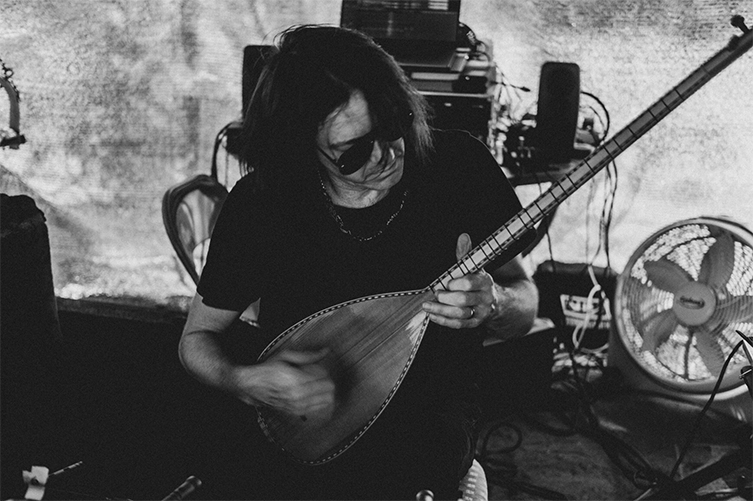
(Photo: Arkia Jahani)
So, I spent the rest of the next day and a half getting all that stuff together. I recorded some electric guitar and some acoustic guitar on a 4-track cassette, sent them the original cassette, I didn’t even make a copy of it. I rode my bike to Kinko’s because I didn’t own a computer at the time, I‘d never even used a computer! I rented the computer by the minute with my credit card. I was a little concerned, ‘this could cost me a fortune: I’ll be here forever!’ (laughs) I was so excited to find that I could make the letters bigger on my resume! And then I could put all that space between the lines, you know, grow the space! Fill the page because there was not much there!
Anyway, I got it all together and I sent it to them. They received it and invited me out to an audition at a Montreal address on Thursday. Which was in a coupla days! And it was December. So, I went up there. This is gonna turn into a short book if I keep going here.
The short of it is, I’d returned home to New Orleans in January, maybe expecting a call one way or another? One day I came home to the light blinking on the answering machine, scrubbed through messages from Danny and Jonathan to hear Carmen from casting. She called to tell me that I was selected, I’d passed the audition and they were gonna send me a plane ticket and to pack my things. Well...it felt good to be wanted, it felt good to go for something and to sort of win the prize, but I hung up the phone and thought, ‘Holy shit, what have I done?’ Because this was a real turning point in my life. I hadn’t told anybody in Nails.
GG: Really? Oh, wow.
RF: Yeah. So, it was an emotional experience to navigate, and one I was unsure of, but I went through it all the same. And...and I met my wife, Bianca, there! (laughs)
GG: Bonus! Wow, that’s fantastic! Was she part of the same show that you were working on?
RF: Yeah.
GG: And was that show Quidam?
RF: Quidam, yeah.
GG: And so, from the outsider’s perspective, it seems like the Cirque Du Soleil is this magical, beautiful experience of joy, but what is the reality for a person in the band playing those shows?
RF: Well, it was a magical and romantic period for me: all was made new, it was joyful, colorful, playful, it was challenging, and I got to experience the stark contrast of being in a sort of blue-collar environment relative to where I was coming from in the NIN bubble, you know. The band in the Cirque Du Soleil are not the shining stars of the troupe: we’re there to support the downstage acts, and often in the dark, etc.
GG: Right, yeah!
RF: And, well, I was very vocal with the composer that I don’t sight-read music. Cuz, I didn’t want to get myself into hot water that I couldn’t climb my way out of! They said, ‘oh yeah, well, oftentimes most of the band do read but this should be fine, we can make an exception’. I said okay, and I repeated myself! (laughs) They assured me it would be fine.
On the very first day of rehearsal – I’d moved all of my life to Montreal, said goodbye to everything – first day of rehearsals, the composer walks in with all these manila folders, all titled and tagged and in French, or Quebecois, and he starts handing them out to the vocalist, the saxophonist, the violinist, the cellist, drummer even, and mine happened to be the last one. I was kinda thinking, he’s probably not gonna, cuz we had that conversation, and he knows that I don’t, no, here’s my folder. (laughs) Oh my god.
So, immediately after that first rehearsal, I went straight to a drug store and bought a cassette Walkman, so I could record the violin player sight-reading my parts. I would take that home to the apartment I was staying at in Montreal, and I would spend all night learning it by ear. Brief aside, that violinist is Martin St. Pierre, with whom I made fast friends, and he totally coincidentally, I mean no connection to me, played with Trent at Neil Young’s Bridge School Benefit a hundred years later.
GG: Goodness!
RF: It wasn’t tough to push my fingers around, it was just a challenge to understand the arrangements and, you know, some of the lines were more complicated than others. Probably the biggest challenge psychologically, especially in the beginning there, was that we’d come to rehearsal the next day and the composer would come in after leaving the round table discussion with all the creative leads of the show. He’d come in and make an announcement: ‘What we did yesterday? Forget that forever!’ I just spent all night memorizing it all! (laughs) And then we get a new folder that I can’t read! And then the band would spend all day doing that and I was treading water for a little bit, so that was unnerving for me. I was able to make it through: I made a lot of my own notes with colored pencils and shapes and things. But yeah, everyone in the band were excellent players.
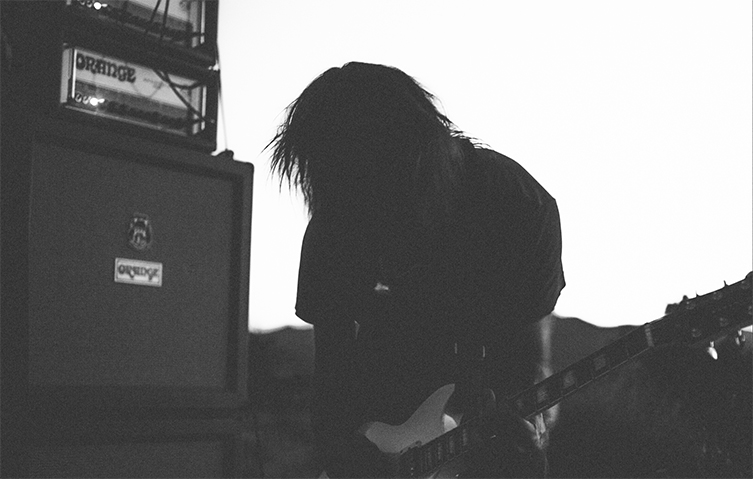
(Photo: Arkia Jahani)
GG: That must have been so different to Nine Inch Nails! I think you’ve mentioned before about how NIN are more ‘orchestrated’ in terms of your parts, plus you do more than play guitar so there’s a lot involved there. Guns N' Roses was presumably more of a standard rock guitar situation for you in terms of your role. Cirque Du Soleil is neither of those things. I just wondered what your tasks were like as a guitarist. I’ve listened to the Quidam music, and it goes all over the place!
RF: Yeah, well we were the first generation, as far as I know, of in-ear monitors, which were horrible. They were like chewing gum with a copper lead, you know, and somebody shouting into the other side of the copper or something! It was just...they were uncomfortable, and they sounded terrible. But they were important for communicating during the performance because sometimes an act would attempt a landing or some flourish or something and miss. They’d try again and we’d all be on a verbal cue from the musical director through a microphone and through our ears. He’d sometimes break into a following section, out of cadence from what would be otherwise musical, because we needed to catch up with where the act had landed, or to draw out a section to maintain some space. Or for them to catch up. So, the pieces were sections, and sometimes they needed to be kinda shoved around.
GG: Aha, ok! That’s really interesting: I hadn’t considered that.
RF: And through rehearsal, through the creation period, we’d see these long days of scheduled rehearsals, maybe every half hour through a ten, maybe twelve-hour day. For each of the acts, they had their half hour or their hour on the stage and when they weren’t there, they were elsewhere with their coach. They had some variety to their routine; I mean their schedule. The band was just on for that entire list! We had to support all of the acts, of course, so they were long days. There was a lot of waiting, you know? And just being on call, as lighting and staging and all the other acts were doing other things. That waiting, and not even (mimes playing an instrument) acoustically fidgeting, got to be a challenge! (laughs)
"My favourite guitar is the one that's in my hands"
It even kinda got me a tambourine solo in the show, one that I really didn’t even want! I was upstage in the dark during a rehearsal in the chapiteau, in the Big Top, and it was stage lit, it was dark in the bleachers. Empty bleachers, which is where Franco Dragone was, the director of the show, revered and fabled by the cast, you know? I was pretty sure he didn’t know my name, but we all certainly knew who he was. He had a wireless mic in the grandstand during rehearsals and just the glow of the cherry of his cigarette in the dark. We’d hear his voice through the PA, the god-mic. We were working on some act, and it was mostly dark, stage lit and I guess it was supposed to be quiet. I was kinda clowning around with this tiny little tambourine drum-thing, and I hear – we all hear- the voice of god, and the glowing ember of his cigarette:
‘ROBEEEN?’
And my heart stopped! I thought I’d broken his concentration and he gonna, like, haul me out! And so, he calls me down, center-stage, and the stage is in the round, you know? A circular stage. ‘Center stage please’. I at once had to grapple with the fact that he can see me, knows my name, and now he’s calling me center-stage. Is he going to, like, berate me in front of everybody for breaking his concentration? Or I dunno: I was starting to get a little defensive about this! (laughs) And I was kinda slump-shouldered, walking toward center-stage in the dark and he follows up, he says: ‘bring your little drum’. And so, I turned around, I bring my little drum. ‘Stand center-stage’ and then he says, ‘Okay, let’s do it again.’
GG: Wow! Hahaha!
RF: He liked what I was doing! And it had been now written into the mise-en-scene, that little scene, forever!
GG: Forever! So, does that mean somebody else is doing that nowadays, all these years later?
RF: Yeah, I guess! (laughs) I ended up having to do that ten times a week! Eventually, the tambourine was velcroed to my back for my entrance (laughs). I walked out with a guitar, played a little guitar and then out came the tambourine.
GG: That is something.
RF: I was looking for something different, boy I got it, hard.
GG: That’s an incredible story, man. One of the best I’ve heard, hahaha!
RF: Needless to say, I'm grateful to have found my way back to NIN after so many years.
GG: Yeah man! Now, I’d love to hear more about the Cirque, but there’s so many things for us to talk about, so let us continue. So, I’ll do a very blunt segue into Danny Elfman!
Danny Elfman
GG: So, the Big Mess album. I’d love to hear all about it: how you met Danny, etc. I’m aware that it’s yourself and Nili Brosh that’s on the record...
RF: Yeah.
GG: So, I’m just wondering which songs and parts are yours? That song Everybody Loves You sounds very much like it has a ‘Robin Finck’ guitar part.
RF: Honestly, I can’t remember all the titles because I had kind of working versions, and so I can’t say definitively without doing a little homework, whether that’s accurate or not. But you know, Danny was booked at Coachella 2020, and he was putting a band together. Josh Freese was already on board, and Josh and I are friends. We played in Guns together and in Nine Inch Nails together, but it was actually Ilan Rubin (Nine Inch Nails drummer) who called to tell me about the thing. Ilan was busy with The New Regime at the time, but he knew Danny’s manager. I think?
Anyway, I was a little nervous to enter the fold there, but it worked out really well. Stu Brooks was playing bass, who’s phenomenal, as is Nili Brosh, whom you mentioned, on guitar. We were waist-deep in rehearsals for Coachella when COVID was catching on, so we were already actively playing together at Danny’s studio as we were hearing, like everybody: we heard about it a little bit, and then a little bit more and then a LOT bit more! I think it was a tennis match or the NBA: things started cancelling, and then we started to think, like: ‘You don’t think they would cancel Coachella? It’s so far outta town, certainly someone will know the Chief of the Fire Department or something! We’ll work something out!’ We had no idea what was coming. It was just heartbreaking to be actively working towards that and then having to, next day, go and pick up our stuff from Danny’s and say goodbye. But we were called back, that same band, later in the year, of course individually now, and in masks, to play on Big Mess.
GG: Right.
RF: That was a lot of fun. The social distancing thing, the masking and all the COVID made it less fun! We couldn’t break together; we couldn’t eat together.
GG: Aw, of course!
RF: I had my own entrance and all this kind of stuff. But yeah, Danny would send me rough demos that he was doing from his house in quarantine. No studio at the place he was staying in, so some of them were sorta brutal sounding, which made them all the more engaging for me to receive! It was really inspiring to behold. Inspired by, you know, him, to just share so freely and immediately. He’s just one of those high output sorta cats! Probably that’s very obvious, but it was fun to be on the receiving end of these private sort of musing and song sketches and things. I got to tool around with some of them at my house, and then, we would Zoom chat and things like this, and eventually, we each in the band had our time individually at his studio space.
GG: One thing I was interested in is: when Danny Elfman sits down to write the Batman or Edward Scissorhands score, it’s one person writing music for a hundred people. In this situation, when he’s giving you demos, was he saying, like: ‘Robin, I want this at this point and this at that point’? Or was he seeing what you came up with?
RF: Um, they were all different. There were so many songs! Some of them had many, many layers of disparate guitar tracks, all playing, that shouldn’t all be heard at the same time! But they were all just different throws and ideas, many of which I thought were perfect the way they were, the way he played them direct into the buzzing laptop or whatever. But he was very open about new approaches, and he wanted to hear what I had to offer, what my sensibility was on the thing.
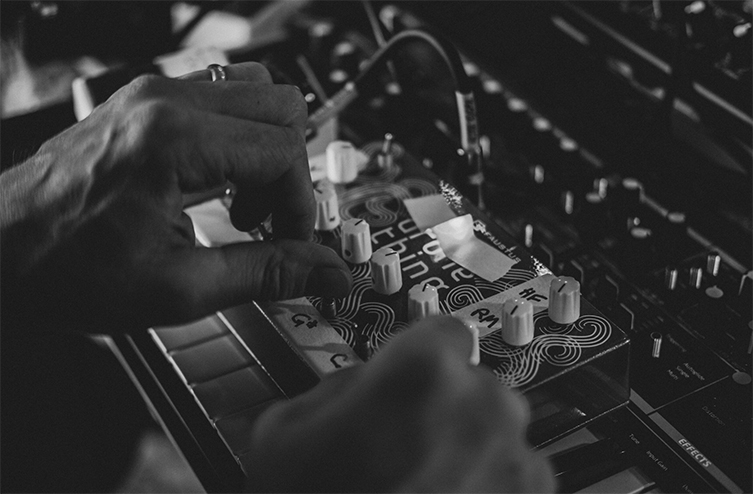
(Photo: Arkia Jahani)
Sometimes there were more obvious riffs that locked with the bass or the kick and snare that I would gravitate to and replay, bigger or with a different sound. Then there would be many other places in these songs where I could offer something. Even standing in his studio space, sometimes he would have very specific ideas of what he would like me to attempt. Or, certainly, where in the arrangement that he would like me to play. And so, we would do that and some of it was reckless abandon, just kind of wild, and other times were much more note specific. He had a written score in front of him for all of it.
GG: Oh, really?
RF: The manuscript, yeah, and he had his eye on the giant timer of the playback, on the Pro Tools session. He would often request from the engineer: ‘Let’s take it from bar 84 to bar 112’ or whatever it was. ‘Back it up two bars’. And there’s a lot of odd time signatures, or I guess the oddity of the time signatures was that they sometimes didn’t feel like they would resolve. Felt broken? In a good, jagged way. They would kinda bump into something new and awkward for a period, and all those kinda things were intentional. Not only intentional, but when I saw it notated? (laughs)
GG: That’s so cool!
RF: So, yeah! It really was. And yeah, I don’t remember the titles of all the songs, but I remember one time him looking at me and saying, ‘Can you play something like...I don’t know', and like he's plucking an apple from a tree, 'something like Jimi Hendrix would do?’ (laughs) Other times, I might have been playing some full six-string chords and he’d have an ear for one of those notes: it’s not the inversion he wants to hear! He wants to hear that note on the bottom. It’s not so much that it might have been the wrong chord, but even the inversion, you know? Because he’s also thinking of the tuned percussion and the orchestra and choirs and all this stuff.
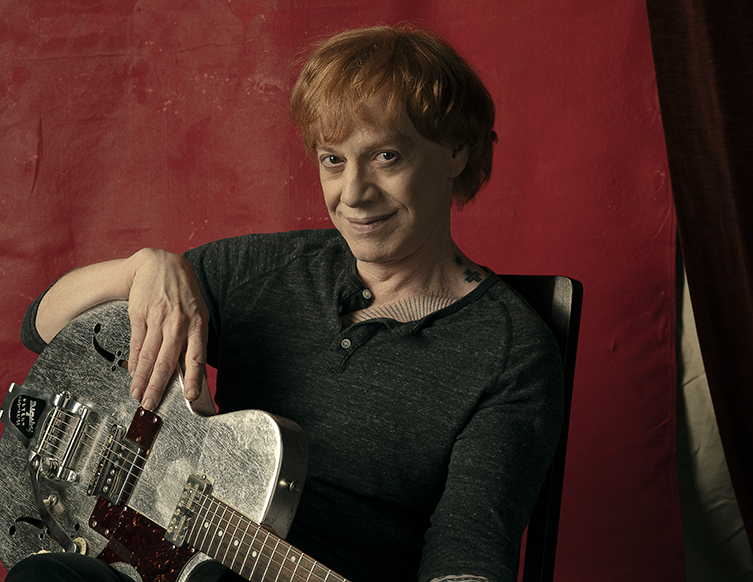
(Photo: Jacob Boll)
GG: What about the gear you used for your parts, then? Presumably you’d have your Reverend signature guitar. There’s loads of cool square-wave fuzz textures and things on the album.
RF: I’m looking behind me here because it’s sitting on the table. I had two tandem signals; I always do this when I record: I have one performance captured by two leads going to two channels. So, it’s going through a line of pedals direct into the board that I may or may not put a cabinet simulator on, and then another one going into an amp with a microphone in front of it. I brought an Orange Rocker 32 amp because they fit in my car. And ya know, it sounds good (laughs). I probably said that out of order!
GG: Hahaha! I liked how that came afterwards!
RF: And the pedal board I kinda put together for the session: I know we used a lot of the RML Electron Fuzz straight into the board, and the Death By Audio Micro Harmonic Transformer. I think those were the most-used direct fuzz sounds that you’re referencing, and then another chain of Fuzz War and Proctavia and other stuff going through the amp.
GG: Yeah, the Proctavia was the one we spoke about last time. I wonder if that’s the sound I’m thinking of in Everybody Loves You: it’s just this big, wicked octave bend.
RF: Oh yeah. It may be a blend. We recorded them in tandem, so what they ended up using would’ve been up to them. And yeah, I played my Reverend model. I love that guitar! Both pickups sound excellent all throughout the volume sweep, and the bass contour at my fingertips makes for immediate better. You wouldn't know it until you had it and then you didn't have it. But I have it and I'm keepin' it.
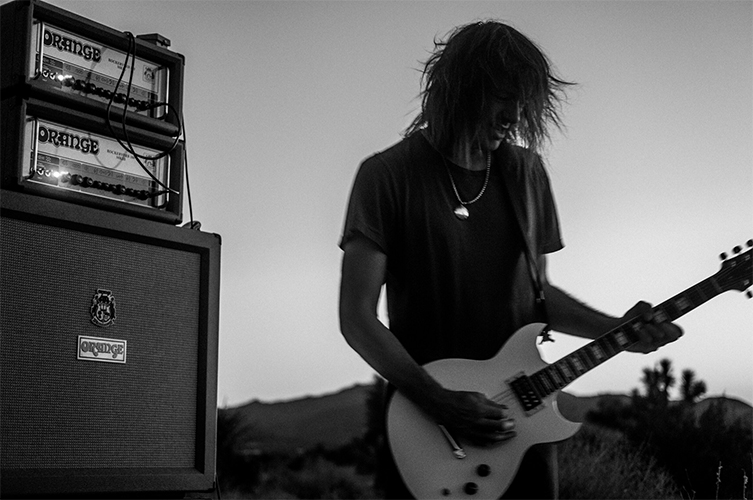
(Photo: Arkia Jahani)
GG: Yeah, last year when we spoke, it had just been released. I was thinking, when I was preparing for this conversation: is this upcoming run of Nine Inch Nails gigs gonna be the first time you’ve been able to really take it out on tour?
RF: Yeah, we were looking at that.
GG: Nice! And you use other Reverend models too? And also, I don’t know, I don’t mean to presume, but on the Ernie Ball video you did, there’s some amazing Custom Shop Telecasters too, blonde ones with mini humbuckers. Are they getting subbed in as well?
RF: From time to time. But my favorite guitar is the one that’s in my hands, and more often than not, it happens to be the Reverend, but I’ve been very fortunate to be sitting with these Fender Custom Shops that you’re referring to, and, you know, I’m certainly not mad about that!
I did play one track, it was actually my last one, my final day at Danny’s studio playing on these songs. It was almost quitting time. We’d done the list that we’d set out to do and he’d kinda asked me: ‘Well, is there anything else that you’d like to try?’ I said, like, ‘Well, is there anything else you’d like to hear?’ He’s more well-versed in the material. And so, he put on a track that I hadn’t heard, ever. I think it was sort of new-ish for him. I forget the name of it, I wish I could tell ya, but there was no rhythmic cadence at the time, it was really just a wash of what sounded like wine glasses, like this pad of ethereal wine-glass-scape, with that deep baritone voice of his.
GG: Ah, In Time. Is it that song?
RF: Oh, that sounds familiar, yes. And there were these swells, these string swells, and he said let’s try something with this. I got behind my Ibanez John Scofield hollow body, it’s kinda like a 335, and an E-Bow, and Danny was at the far side of the room with his little battery powered Casio that he always has in his lap, just to kinda hammer out notes, you know? To pull out these intervals and chord shapes and things like this? And he’s kinda knuckling around as the track is playing back in the control room, and I would E-Bow a note and he would kinda like stare at the ceiling and knuckle through another note. He’d verbally call the note to me, and I’d grab the note on the neck of the guitar with the E-Bow, and then he’d repeat, and he’d call the note to me, and I’d grab the note. And this was all in real-time as we’re recording it, so it was really fun! I felt like I was truly an instrument of ...he was certainly in the drivers’ seat. He was at the wheel: I was the wheel! (laughs)
GG: That sounds thrilling!
RF: It was fun, and sometimes I would be so high or so low towards the nut that I’d maybe just run out of notes! So, I’d have to jump the string to grab the next one that he calls out and so that created some variety. That was the last thing we did together.
Twin Peaks
GG: That’s incredible, what a story! There are so many great moments here, I’m so glad you’re sharing them with me. Now, you’ve been so generous with your time, Robin, and I know how busy you are, but just before we have to say goodbye, you are in one of the greatest TV shows ever filmed. You appeared in Twin Peaks, of course, playing She's Gone Away at the famous Roadhouse! As a fan of David Lynch, I’m just wondering: what was that like, the day you went and filmed that?
RF: Yeah, I absolutely love David Lynch vibes, like so many. Twin Peaks is such a touchstone for me in so many ways. I remember standing behind the curtain on the Roadhouse stage and locking eyes with Trent the moment the MC inadvertently introduced us as The Nine Inch Nails. And then the curtains opened! (laughs) And at the end of the thing, David yelled from the back of the room: ‘Trent! Can we use ‘The Nine Inch Nails’? I really like that!’
When I finally saw the episode and how out-there it is, and what a boundary defying episode of episodes it is, it’s just neat to have stood there in the fabric of it all, even in some small, angular way.
GG: That’s right: you’re in that episode that’s mid-way through the Season, with all of that incredible nuclear stuff!
RF: Yeah!
GG: I forgot that’s when you guys showed up! I’ve only been able to get through Season 3 once, it’s quite a tricky thing to watch. But yeah, amazing!
RF: Yeah, it was cool.
"At the end of the thing, David yelled from the back of the room: 'Trent! Can we use THE Nine Inch Nails? I REALLY like that!"
At this point, we began rounding things up, and Robin reiterated his excitement and commitment to EYES OUT, as they bring their rich lore and playable experiences to the world. Judging by who’s involved, I can’t wait! Although he remained understandably tight-lipped on the exact nature of their forthcoming games output, he shared a ton of detail about all of our other subjects. It turned out to be a most celebratory conversation after all!
I’m very thankful to have had the opportunity to ask him about all this stuff in the first place, and it was a pleasure to just sit and listen to such an eloquent storyteller share details about what is a very unusual and interesting life. Incredibly, in the two conversations we’ve shared, there’s been so many topics to get through that we’ve never really spoken about his long tenure in Guns ‘n’ Roses! That kind of says a lot about the guy, when we have to relegate such a huge subject to the by-lines for another day! So it goes.
While it’s disappointing that NIN will not be playing for the rest of the year, it’s undoubtedly the safest decision, and one made with their audience in mind. We await the eventual return of these industrial masters when the time is right.
In the meantime, there’s a new Danny Elfman album to check out if you haven’t already done so, and there is the excitement of EYES OUT! Keep your eyes open (sorry) for their announcements over at the official EYES OUT website, and stay up to date with The Nine Inch Nails on the NIN website.
We’d like to thank Robin for being so accommodating and sharing, and for giving up his early Friday morning for us. It was worth it! We’d also like to thank Ken Haas for all of his help, too. As always, the biggest thanks go out to you! Thanks for reading this article and for choosing to spend some time here with us. For more like this, waltz across to the guitarguitar interviews page at your own leisure and find more from Robin, as well as interviews with Billy Corgan, Dead Can Dance, Steven Wilson and many, many more!
Until next time
Ray McClelland

